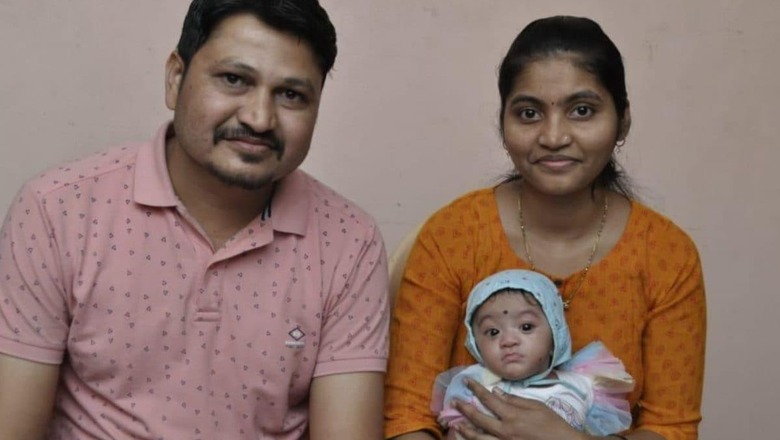
views
An IT professional based in Pune, Ujjawala knew that her pregnancy was going to be a tough one. She was not sure if her baby would survive. Despite several efforts to continue the pregnancy, she prematurely delivered a girl.
Baby Shivanya weighed only 400 gm, less than a pouch of half a litre milk – ideal birth weight hovers between 2.5 kg to 4.5 kg. She was as small as the size of a foot, around 30 cm.
While the baby was born at a nursing home in Chinchwad, she was immediately moved to a super specialty hospital called Surya Mother and Child Super Specialty Hospital in the same district.
But Shivanya’s survival story was not smooth as she fought multiple battles in her first three months. After a 94-day stay at Pune’s largest private hospital, she was discharged at a healthy weight of 2.13 kg.
The hospital claimed that this made Shivanya India’s first 24-week premature baby, born at 400 gm, who managed to survive. Earlier, there was another case of a baby born at 22 weeks and weighing 492 gm at an Ahmedabad hospital in 2019.
“When I saw her for the first time, her eyes were wide open. Despite being a premature baby, whose development was not yet complete, her first glance gave me the confidence that she will survive,” Ujjwala told News18.
When Ujjwala was on bed rest for months, she said she binged on movies reflecting valour. “I watched Manikarnika: The Queen of Jhansi, Shivaji Maharaj, Bhagat Singh and others. My daughter showed similar resilience and proved to be a fighter,” she said.
She and her husband Shashikant Pawar – both IT professionals working at reputed firms in Pune – spent close to Rs 21 lakh on their hospital bills. “Our employers contributed, crowdfunding sources worked and we used up all of our savings. But the fight was worth it.”
Story of Shivanya’s survival
On May 21, when Shivanya was born, the team of neonatologists and NICU (neonatal intensive care unit) nurses retrieved the baby from the nursing home in their portable ICU, within hours of her birth.
The baby came in with the biggest challenge of immature organs, which needed artificial support to help recover and reach the milestone of “normal growth chart”. But the first challenge was that all the available equipment required to support organ growth were “too big”.
Ujjwala describes her daughter “as tiny as the size of a foot”. Shivanya’s length at birth was just 30 cm, shorter than the usual length of 48 cm to 50 cm.
The doctors first modified the equipment, starting from oxygen masks to other devices, to suit the baby’s weight and fragile skin. “It was ensured that the size of the tubes, IV lines, catheters etc used during the process do not harm the baby,” said Dr Sachin Shah, director, neonatal and paediatric intensive care services.
Dr Shah and his team took charge of the situation as they had earlier handled premature birth cases successfully and claimed to have had the highest survival rate in the country at 97 percent.
“This was the most challenging aspect of the care because life-saving techniques and infrastructure available in current healthcare scenarios are tuned to support babies of bigger size and not micro-preemies,” the doctor said.
‘Micropreemies’, or babies born prematurely – especially those who are underweight (less than 750 gm) – are extremely fragile. They have to be cared for in an intensely sterile, womb-like environment to ensure the entire clinical process of saving them is gentle yet effective.
Journey of her growth
All the organs were immature and Shivanya was put on artificial life support. She was connected to a ventilator and given medication for lung functioning, as premature babies face the challenge of partially formed lungs.
“She needed ventilation for the first weeks, including an advanced mode of high-frequency ventilation. She needed non-invasive respiratory support till 88 days of age following which she was breathing normally in room air,” Dr Shah said.
Special catheters were inserted into her belly button for sampling and giving nutrition as well as medicines. Also, feeds were started through a specially designed tube inserted from mouth to stomach and increased slowly as tolerated.
“The baby reached full feed on Day 16 via a feeding catheter. Oral feeds were initiated on Day 76 and the baby slowly started accepting that,” Dr Shah said, adding that the baby slowly started putting on weight and reached 1 kg on Day 51 – this was an important milestone.
Her skin was also fragile and she was kept in a special incubator to prevent skin breakdown and fluid losses. Everything was done while ensuring infection control around the baby.
Hiccups in the journey
According to Dr Shah, Shivanya’s case is the most unique case ever managed at the hospital or even in the country. While the baby already struggled from lower birth weight and immature organs, the new chronic conditions made her survival even more difficult.
Reason: The baby faced multiple challenges in her growth journey such as respiratory distress syndrome, chronic lung disease, anaemia, apnoea of prematurity and retinopathy of prematurity.
“But she made it. She is now a happy and healthy six-month-old and has not reported any health concern whatsoever,” Dr Shah said, who has been consulting with the parents on a regular basis.
According to Dr Madan Gopal, a senior consultant (Health) at Niti Aayog, the survival of Shivanya is a “huge success” of the medical fraternity. “It is a heartening reflection of improvement in capacities of healthcare facilities and enhanced abilities of professionals in managing critical premature deliveries,” Dr Gopal said.
“We expect this case to serve as a learning and inspiration for healthcare professionals across other regions,” the doctor said. “Saving Shivanya from being born in a very fragile stage has not just been a matter of pride for Surya Hospital, but it’s a moment of pride for hospitals and the medical fraternity across the board, as well as for the state of Maharashtra.”
Read all the Latest India News here




















Comments
0 comment